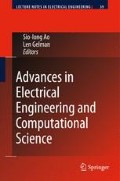The Model Reference Adaptive System (MRAS) is probably the most widely applied speed sensorless drive control scheme. This chapter compares induction motor speed estimation using conventional MRAS and AI-based MRAS with Stator Resistance Compensation. A conventional mathematical model based MRAS speed estimation scheme can give a relatively precise speed estimation result, but errors will occur during low frequency operation. Furthermore, it is also very sensitive to machine parameter variations. An AI-based MRAS-based system with a Stator Resistance Compensation model can improve the speed estimation accuracy and is relatively robust to parameter variations even at an extremely low frequency. Simulation results using a validated machine model are used to demonstrate the improved behaviour.
Access this chapter
Tax calculation will be finalised at checkout
Purchases are for personal use only
Preview
Unable to display preview. Download preview PDF.
References
Finch, J.W. and Giaouris, D., Controlled AC Electrical Drives, IEEE Transactions on Industrial Electronics, Feb. 2008, 55, 1, 1–11.
Landau, Y.D., Adaptive Control the Model Reference Approach, 1979: Marcel Dekker, New Yo r k.
Vas, P., Sensorless Vector and Direct Torque Control, 1998: Oxford University Press, Oxford.
Shauder, C., Adaptive Speed Identification for Vector Control of Induction Motors without Rotational Transducers. IEEE Transactions on Industry Applications, 1992, 28, 1054–1062.
Yang, G. and T. Chin, Adaptive-Speed Identification Scheme for a Vector-Controlled Speed Sensorless Inverter-Induction Motors. IEEE Transactions on Industry Applications, 1993, 29, 820–825.
Fitzgerald, A.E., C. Kingsley, and S.D. Umans, Electric Machinery. 6th ed., 2003: McGraw-Hill International Edition, New York.
Vas, P., Artificial-Intelligence-Based Electrical Machines and Drives. 1999: Oxford University Press, Oxford.
Kumara, I.N.S., Speed Sensorless Field Oriented Control for Induction Motor Drive. Ph.D. thesis, 2006, University of Newcastle upon Tyne.
Leonhard, W., Controlled AC Drives, a Successful Transition from Ideas to Industrial Practice, 1996: Elsevier, Amsterdam, Netherlands.
Zhen, L. and L. Xu, Sensorless Field Orientation Control of Induction Machines Based on a Mutual MRAS Scheme. IEEE Transactions on Industrial Electronics, 1998, 45, 824–831.
Holtz, J. and J. Quan, Drift-and Parameter-Compensated Flux Estimator for Persistent Zero-Stator-Frequency Operation of Sensorless-Controlled Induction Motors. IEEE Transactions on Industry Applications, 2003, 39, 1052–1060.
Ohtani, T., N. Takada, and K. Tanaka, Vector Control of Induction Motor without Shaft Encoder. IEEE Transactions on Industry Applications, 1992, 28, 157–164.
Peng, F.Z. and T. Fukao, Robust Speed Identification for Speed-Sensorless Vector Control of Induction Motors. IEEE Transactions on Industry Applications, 1994, 30, 945–953.
Vasic, V. and S. Vukosavic, Robust MRAS-Based Algorithm for Stator Resistance and Rotor Speed Identification. IEEE Power Engineering Review, 2001, 21, 39–41.
Author information
Authors and Affiliations
Editor information
Editors and Affiliations
Rights and permissions
Copyright information
© 2009 Springer Science+Business Media B.V
About this chapter
Cite this chapter
Yang, C., Finch, J.W. (2009). A Comparison of Induction Motor Speed Estimation Using Conventional MRAS and an AI-Based MRAS Parallel System. In: Ao, SI., Gelman, L. (eds) Advances in Electrical Engineering and Computational Science. Lecture Notes in Electrical Engineering, vol 39. Springer, Dordrecht. https://doi.org/10.1007/978-90-481-2311-7_7
Download citation
DOI: https://doi.org/10.1007/978-90-481-2311-7_7
Publisher Name: Springer, Dordrecht
Print ISBN: 978-90-481-2310-0
Online ISBN: 978-90-481-2311-7
eBook Packages: EngineeringEngineering (R0)

